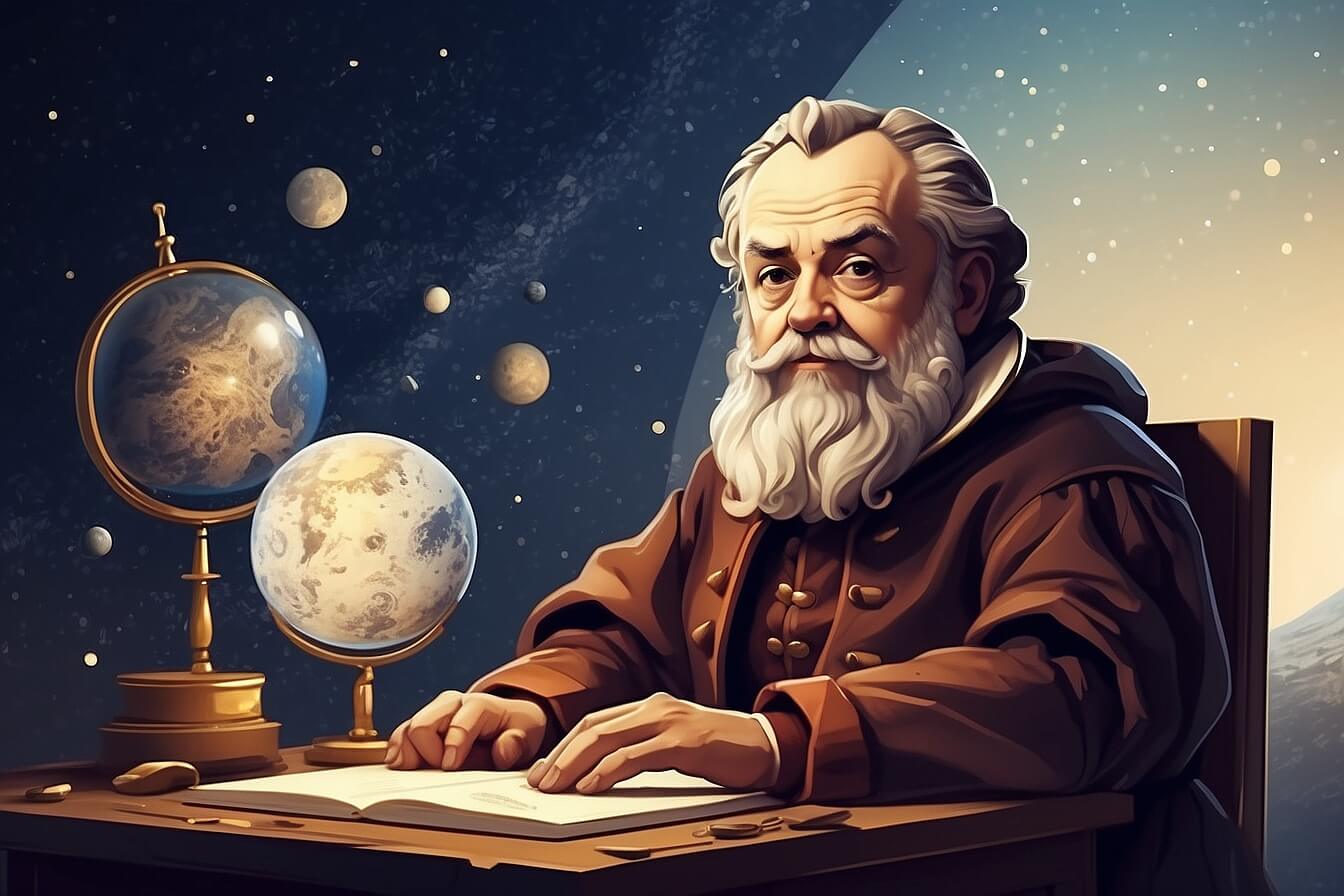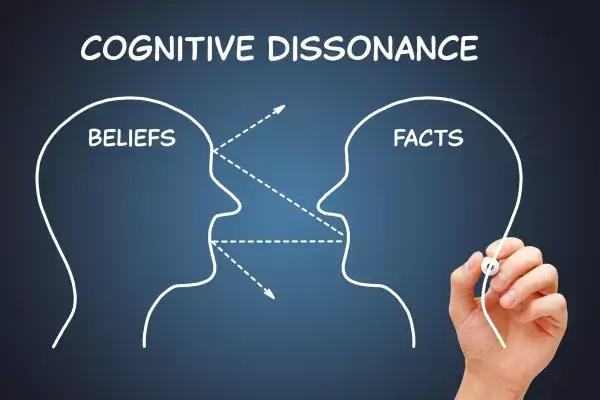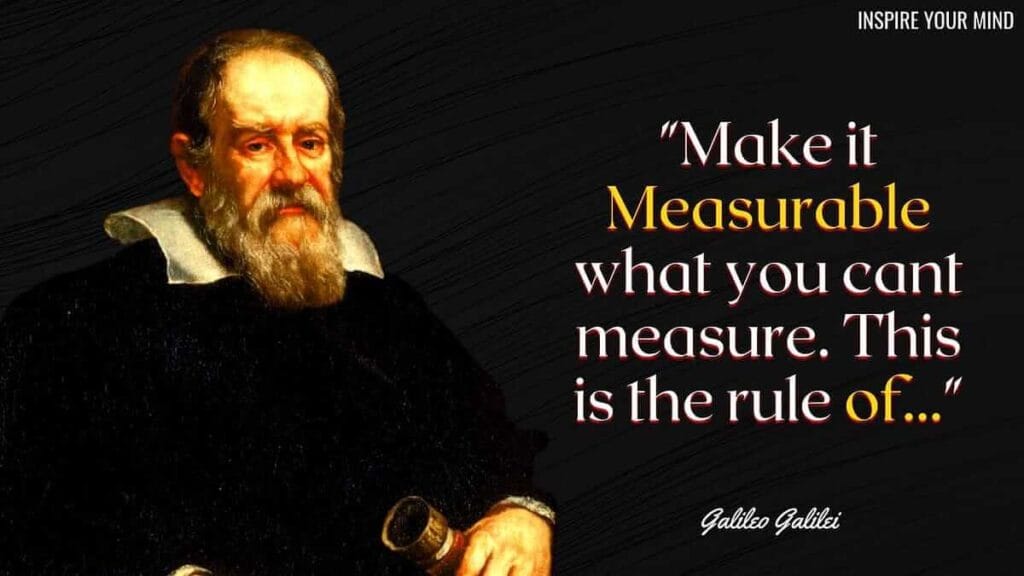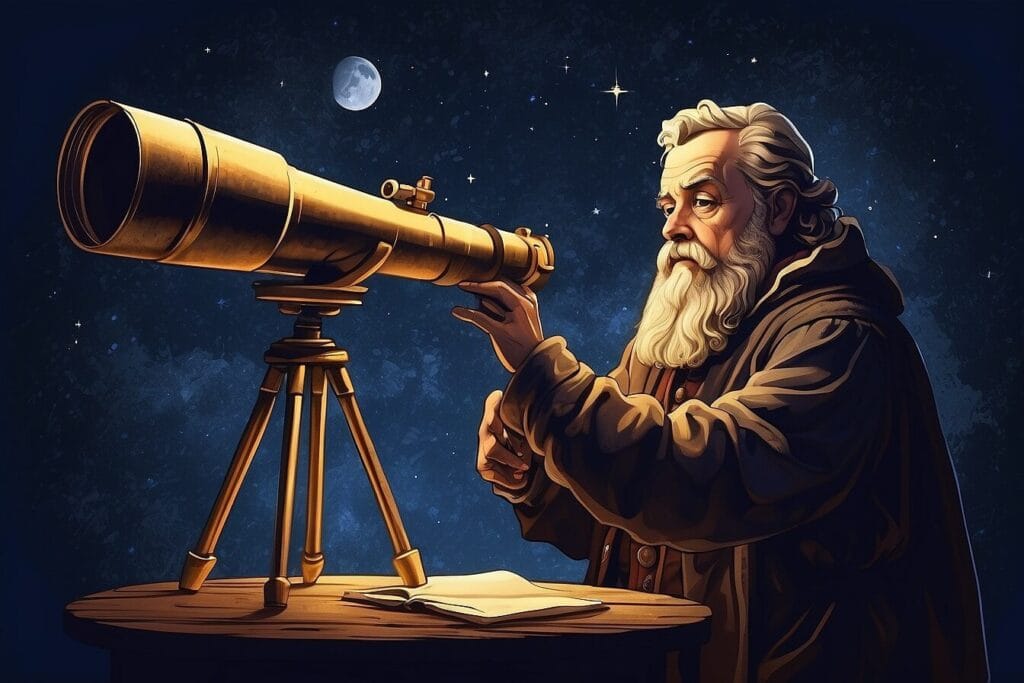
Galileo Galilei is known as “the father of modern science.” The fact that he was willing to advocate and fight against erroneous beliefs also influence human thought in the field of science. He birthed forms of reasoning and patterns of thought that continue to shape how we think today. To our surprise, many of Galileo’s ideas reflect in psychology and spirituality. So, let us explore seven shocking ways Galileo’s work continues to shape our psychology.
1. Challenging Old Beliefs and Discussing Cognitive Dissonance
This fact came up against powerful religious authorities in his time. As a psychological example, this relates to what is known as “cognitive dissonance” when conflicting beliefs tax the human mind.
Islam also instructs us to challenge blind following. In the Qur’an, we read: “Do they not reflect upon themselves? Allah created the heavens and the earth and everything between them in Truth…” (Qur’an 30:8)
Case Study: A man believed misfortune came exclusively from stars. Initially, the cognitive dissonance was destabilizing, but finding the truth ultimately provided him with inner freedom.

Did you know?
By using Dutch inventors and building upon their designs to create his own telescope, Galileo showed how the mind can build and expand through our ideas.
2. Observation and Mindful Thinking
Galileo was a great observer of stars, moons, and planets. When he invented the telescope, he was permitted to observe worlds that he and no one else had ever seen. From a psychological perspective, this connects to mindful thinking, or the ability to notice a thought and not reject it outright.
If Galileo was able to study the celestial skies free of bias, we can observe the skies of our inner worlds better, too.
Case Study:
A woman was seeking relief from anxiety and learned mindfulness by learning to recite the Qur’an. She approached her chosen observation with care, just as Galileo would have with his telescope, and once she became aware of her internal dialogue, she began to recognize patterns in her internal conversation, and her sense of peacefulness was growing a little.
Interestingly, Galileo discovered that over time, Jupiter has moons, thereby fundamentally interrupting the idea that the Earth had always been at the center of everything. To some degree of certainty, mindfulness interrupts the false idea that we believe we are at the center of all.
Read more: Newton’s Laws of the Human Mind
3. Resistance to Authority and independent thought
Galileo was put on trial by the Church for taking a position on heliocentrism. His bravery reflects a kind of psychological independence. Often, humans will ignore basic, truthful realities and instead conform to authority. Psychologists refer to this as the “obedience effect.”
Stanley Milgram conducted a famous study in 1961 with American participants who would obey orders from authority figures to take action that caused harm to others. In the same manner, Galileo took a stand that represents monumental resistance. It shows that the mind is incredibly powerful, and true independence can only happen when one can perceive false voices and dismiss them.
Islam is very much about securing truth above blind obedience for this very reason. The Qur’an says, “And do not pursue that of which you do not know” (Qur’an 17:36). Faith is not an unthinking transference of blind faith.
Case Study: A young student spoke out against the cultural superstitions that people in her community were enacting. In time, people began to admire her courage. In this case, her independence – like Galileo’s independence – saved people from idiotic things.

4. The Telescope and Expanding Perspective
The telescope expanded the human eye beyond comprehension; psychology has shown us that expanding one’s mental perspective gets us out of narrow thinking.
Islam emphasizes perspective; it is God who commands us to reflect on our perspective by way of the vastness of creation in Surah Al-Mulk: “And We have certainly beautified the nearest heaven with stars” (Qur’an, 67:5). When we observe the heavens, we can expand our inner vision.
Case Study: A business entrepreneur continually failed because he only thought about immediate profit. It wasn’t until Christopher got a broader perspective that he strategized for the long term. Only after he put his inner telescope to work did his enormous success happen.
Interesting Fact: Galileo’s telescope could magnify objects 20 times in size; similarly, sometimes when we reflect, we can magnify the hidden truths of the soul.
Did you know? For over 200 years, Galileo’s books were banned. No wonder, because truth always finds a way through human thought.
5. Truth vs. Ridicule and Psychological Resilience
Research shows that, on an increasing basis, resilient people recover more quickly than other people in stressful situations. A 2019 study from the American Psychological Association found that resilient workers demonstrate more effective behaviors in coping with pressure in the workplace. The power of Galileo’s mental resilience still inspires educators of psychology today.
Example Case Study: A new teacher was sharing Islamic knowledge as a substitute and in a hostile environment [field of education]. The teacher endured ridicule and stayed patient, and was later able to reflect that some students ended up telling the truth. The teacher displayed resilience and did so in the same spirit as Galileo.
Did you know? Galileo’s theory of heliocentrism was later fully defended by Newton. Resilience is to retain our ideas until time vindicates the situation.
6. Planetary Cycles and Human Development
Modern psychology studies “developmental cycles.” Erik Erikson explained that humans have vertical life cycles of growth, like cosmic orbits or planetary motion through the cosmos.
Islam also refers to lunar cycles as signs. Allah says, “They ask you about the new moons. Say they are measurements of time for mankind and for the pilgrimage” (Qur’an 2:189). The cycle of time is a metaphor for spiritual and mental growth.
Fun fact: Galileo discovered that Venus also experiences phases, just like the Moon. Venetian phases confirmed that the center of the Solar System was the Sun, not the Earth. Human growth, like that which is the basis of planetary motion, is also illustrative of where light lies in its true form.
7. Science, Faith, and Our Inner Universe
Galileo believed science and faith could coincide. His discoveries demonstrate that the universe operates by divine order. Psychologically, humans carry their own inner universe with hidden rules. Modern neuroscience shows that the brain mimics a cosmos. Billions of neurons mirror billions of galaxies.
Did you know: Galileo discovered, through his explorations of the Milky Way, countless stars invisible to the naked eye? Like countless stars, our soul has infinite lights that are invisible until faith reveals them.

Conclusion
Galileo’s telescope fundamentally changed astronomy, but the greater contribution was to human psychology. He unveiled first a bravery in separating ourselves from misinformation, then a rigidity in observing with a conscious unwritten eloquence, and then a unique approach to independent thinking. Lessons from the perspective of Islam, psychology, and even lived experiences affirm Galileo’s learnings. The universe above is a mirror to the universe within.



Leave a Reply